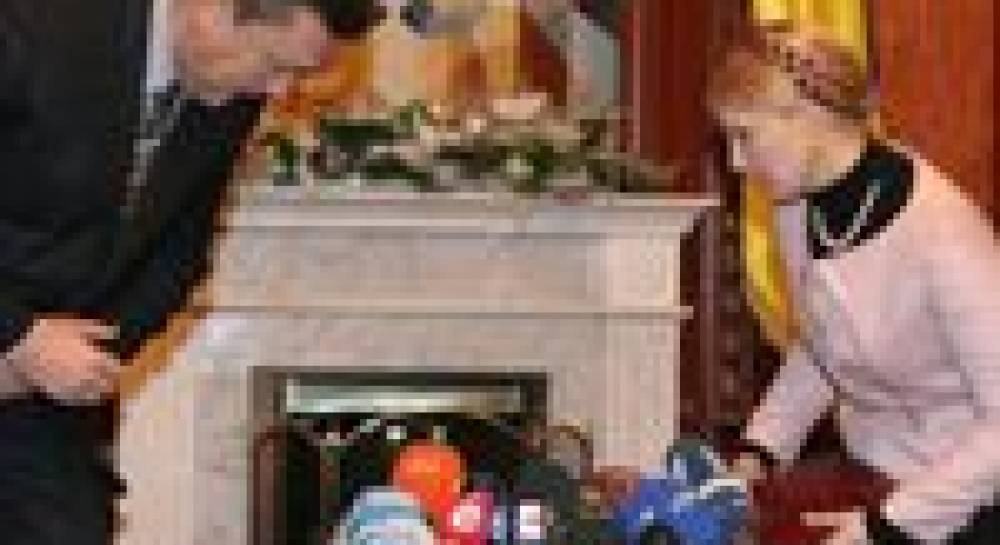
Bringing Ukraine into the European Club
European countries and international organizations trying to assist Ukraine have often been confused about which leader they should be dealing with in Kyiv... A prolonged three-sided struggle for power lead to a series of serious political crises...
Many of us who watched the Orange Revolution with admiration four years ago have become disappointed with its failure to usher in a period of democratic stability and sustained reform. Recent crises have strengthened this feeling.
Nonetheless, there have been some clear improvements. Media censorship has ended, elections are free and fair, civil society is flourishing and the economy is more open. These are considerable gains, especially when compared to developments in Russia. But that is a very low benchmark to set. The Orange Revolution promised something more substantive -- an economic and political transformation that would put Ukraine firmly on the path to membership of the European Union.
But this hasn`t happened yet, and part of the responsibility for this lies with the EU itself. Europe`s soft power proved remarkably effective in encouraging the transition from communism to democracy in Eastern Europe but only when the promise of full membership was the end goal. It was only the prospect of inclusion in the EU club that encouraged the emerging democracies to make the painful sacrifices required to get there. It also provided the financial support and political supervision needed to meet the immense legislative and administrative challenges involved. The problem with Ukraine is that it expected to achieve the same results without any support or a clear statement that membership is an achievable goal.
Ukraine needs a clear signal that it is an integral part of the European-Atlantic community of democracies. U.S. President Barack Obama`s desire for a new start in relations with Russia is understandable, as is German Chancellor Angela Merkel`s recent call for Ukraine and Russia to work toward a new understanding. But Ukraine should not be regarded merely as a factor in relations between great powers. It is a sovereign country in its own right and deserves to be treated as such. Europe should not lose sight of its fundamental values by failing to respect the legitimate interests and aspirations of a major country like Ukraine.
Yet the major reasons for Ukraine`s disappointing progress are to be found in the deficiencies of its own political system. Without united leadership and effective political institutions, it is difficult for any country to chart a clear and consistent path. Unfortunately, the deal that allowed President Leonid Kuchma to step aside in 2004 also saddled his successor with constitutional restrictions that undermined his capacity to govern. By weakening the office of president and creating an unstable and ill-defined division of powers with the prime minister and the parliament, this created sharp division at a time when unity was most needed. The result has been a prolonged three-sided struggle for power leading to a series of serious political crises.
The most recent crises were the gas dispute with Russia and a serious economic downturn. European countries and international organizations trying to assist Ukraine have often been confused about which leader they should be dealing with in Kyiv. The International Monetary Fund`s frustration over the terms of a badly needed loan package with the government is a case in point. President Viktor Yushchenko and the Central Bank were willing to agree on workable terms, but the second tranche of the package was held up because of irresponsible political bickering elsewhere. Agreement now appears to have been reached, but Ukraine`s international credibility has again suffered in the process.
The rest of Europe has little patience for dealing with leaders who put their own ambitions before the interests of their country. Yes, Ukraine has a presidential election in less than a year, and the potential candidates have a right to set out their positions. But most mature democracies are able to keep political competition within acceptable constitutional boundaries. This is true even in countries like Germany, where the main political rivals are in coalition together. Part of the answer for Ukraine centers on constitutional reform to create a clearer and more efficient political order. Another part of the answer is for Ukraine`s political class to develop a culture of restraint and self-control in the national interest.
The EU should be willing to do much more to help Ukraine through this crisis and beyond, but it also needs to feel more confident about the country`s political direction. This once seemed clear, but now there is doubt. Efforts to secure a $7.4 billion loan from Russia appear odd coming so soon after a dispute in which Ukraine expressed concern about excessive energy dependence on the same country. A country committed to European integration should enjoy a close and intimate partnership with the EU, leading to eventual membership. A country seeking to exploit its intermediate position between Russia and the EU for short-term gain deserves a different kind of relationship.
Ukraine is too important to be relegated to the sidelines of European policymaking. Ukraine`s difficulties should galvanize the EU to develop new policies of engagement and assistance. This should be a pragmatic endeavour, focused on practical results and backed by adequate financial support and real political will. The agreement signed by Yushchenko and European Commission President Jose Manuel Barros on EU funding to increase safety and capacity of Ukraine`s gas pipelines is an important step for future cooperation.
There is only so much that can be done from Brussels. The leaders in Kiev have to meet their side of the bargain, too.
Ari Vatanen is a member of the European Parliament.

